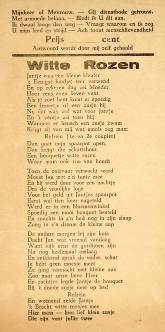|
Willy Derby - White roses
Dutch songs with English translation, translated in English

Willy Derby - White roses
Lyrics: Henk Paauwe / Music: L. Tummers
(1935)
Willy Derby - Witte rozen
Tekst: Henk Paauwe / Muziek: L. Tummers
(1935)
© copyright translation

Dutch song Willy Derby - Witte rozen
with lyrics, music, video and English translation songtext

english translation
is archived
and can't be shown
publicly for now
dutch lyrics
cannot be shown
listen to the song
in the video

english translation
is archived
and can't be shown
publicly for now
dutch lyrics
cannot be shown
listen to the song
in the video

english translation
is archived
and can't be shown
publicly for now
dutch lyrics
cannot be shown
listen to the song
in the video

english translation
is archived
and can't be shown
publicly for now
dutch lyrics
cannot be shown
listen to the song
in the video
© copyright translation

|
|
|
Willy Derby (1886-1944), stage name of Willem Dieben, was probably the most beloved and successful Dutch singer in the years between the two World Wars (the 'interbellum' in the 1920's and 1930's). He sold roughly ten million records. He started his career as singing bar waiter in Antwerp and New York and on the ferryboat from Holland to Harwich, England.
His wife Adelaïde encouraged him to find work in the theatres. First he sang with his brother Lou Bandy (as The Bandy Brothers), but their personalities clashed too much. From 1915 onward he had his own singing career and owned several record shops in The Hague. The financial success was very convenient, because he not only had his wife, but also provided for his mistress, Teddy.
Early in the 1930's Willy Derby lost all his money, because of the economic crisis. Although he had had a heart attack in 1933, he kept working fanaticly. Every year he released several albums. He had to record them in a studio in Berlin, Germany.
|
|



|
|
Some of his most well-known songs (beside above song) are: 'The proud beggar's heart'/'Het fiere schooiershart' (1919); 'Hello Bandung'/'Hallo Bandoeng' (1926); 'Dreamland'/'Droomland' (1934); 'Two lovely blue eyes'/'Twee ogen zo blauw' (1935); and 'On the Grebbeberg'/'Op de Grebbeberg' (1940).
In World War II Willy Derby sang veiled critical songs about the Nazi-occupation, for example 'On the Grebbeberg'/'Op de Grebbeberg' (1940) by Jacques van Tol. Two times he was put in prison. Several times his mistress smuggled his heart medications into prison (saving his life and risking her own), but unfortunately his health worsened nevertheless. A few weeks after Teddy ended their relationship in 1944, Derby died from a heart attack, only 58 years old.
The above song 'White roses'/'Witte rozen' (1935) is a classic example of a 'smartlap': a tear-jerker, a sob song. In Dutch music, this is a 'lifesong' ('levenslied') in which someone dies. The song was covered by many singers over the years, like Willy Alberti & Johnny Jordaan, Manke Nelis, the Zangeres Zonder Naam, André Hazes, De Straatzangers and Jan Smit.
 More translated Dutch songs in the genre 'life song' ('levenslied, smartlap') and more with the theme 'songs about family' or 'songs about passing away'. See also the list of Dutch singers with all their songs on this website. More translated Dutch songs in the genre 'life song' ('levenslied, smartlap') and more with the theme 'songs about family' or 'songs about passing away'. See also the list of Dutch singers with all their songs on this website.
|
|
Search all Dutch pop songs, chansons
alphabetically / genres / themes
singers / songwriters
∗ ∗ ∗
 Find over 3000 Dutch and English songtexts Find over 3000 Dutch and English songtexts 
on our Dutch website 'Nederlandse en Engelse songteksten'
∗ ∗ ∗
 nederlandse liedjes met muziek vertaald naar het Engels met Engelse vertaling nederlandse liedjes met muziek vertaald naar het Engels met Engelse vertaling  niederländische lieder mit musik aus die Niederlande mit übersetzung in Englisch niederländische lieder mit musik aus die Niederlande mit übersetzung in Englisch  chansons néerlandais de pays bas hollande avec traduction en anglais chansons néerlandais de pays bas hollande avec traduction en anglais  canciones holandes de países bajos con translaciones traducción en inglés canciones holandes de países bajos con translaciones traducción en inglés  canzone olandese olanda con musica traduzione inglese canzone olandese olanda con musica traduzione inglese 
|
∗ ∗ ∗
© copyright translation
(2017)
|





 Find over 3000 Dutch and English songtexts
Find over 3000 Dutch and English songtexts 